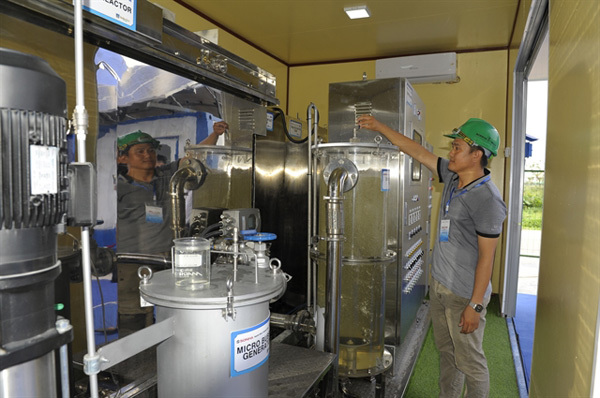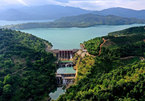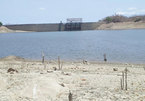 |
|
A worker operates waste water treatment system in Dong Anh District in Hanoi.
|
Phan Xuan Dung, chairman of the National Assembly’s Committee for Science, Technology and Environment, made the statement in a conference held on Monday in Hanoi.
The conference themed 'Water security for production, daily life and safety management of lakes and dams' aimed to clarify the current situation of water security in Vietnam today and discuss solutions for water security management, water insecurity response and control for the next 20-30 years.
Challenges
The first challenge for water management and security was the imbalance in water for production and daily life, said Dung.
The impacts of climate change and rising sea levels are threatening freshwater resources and limiting farming area.
There are still some limitations in water management and regulation of water resources, including a lack of water storage space to prevent droughts.
"The problem of water pollution from production and daily life activities is due to the pressure from economic development, the increase in waste discharges into rivers and streams affects the supply of water for daily life and production,” said Dung
In addition, water sources depend heavily on upstream rivers and over-exploitation on the main upstream affects the quantity and quality of water flowing into Vietnam.
Watershed forest degradation also affects the water-holding capacity of river basins and water use efficiency is low, with the exploitation capacity of irrigation works not up to snuff.
"The amount of water is abundant but the technical infrastructure is not yet guaranteed to store water, the efficiency of using water is low and the water loss is large," Dung said.
In that context, Dung emphasised water security was an issue for many countries and solutions should ensure freshwater ecosystems, marine ecology and related ecosystems are protected and strengthened, in tandem with sustainable development and political stability.
In addition, he said all people should have full access to clean water at a reasonable cost, and vulnerable people should be protected against risks from water-related disasters.
Urgent measures
In Vietnam, to ensure water security, the National Assembly has issued laws like the Law on Water Resources, the Law on Irrigation, the Law on Environmental Protection, the Law on Hydrometeorology and the Law on Natural Disaster Prevention.
Dung said current circumstances required a solution to manage and use water in a holistic manner to ensure sustainable development.
The committee’s statistics show currently nearly 7,000 dams, irrigation lakes and hydroelectricity works have been built and operated. However, at present, the lakes and dams are out of date, including more than 1,000 damaged or badly degraded lakes and dams.
In natural disaster conditions, the risk of safety loss is very great.
“This is a big challenge for State management agencies and the political system during the process of the exploitation and operation of dams and reservoirs to ensure both socio-economic development and absolute safety downstream and stabilise people's lives,” said Dung.
Ensuring water security and safety of dams is an urgent issue and it’s important to change thinking in management and use of water resources because it has a great influence on people’s life and socio-economic development of the country.
The total average flow of rivers in many years is about 830-840 billion cubic metres. In terms of underground water, there is a reserve of about 189.3 million cubic metres per day.
The average annual rainfall of Vietnam is about 1,940-1,960mm, equivalent to about 640 billion cubic metres per year. VNS

Joint efforts needed to protect water resources: Vietnam River Network
Vietnam News Agency speaks to Dao Trong Tu, head co-ordinator of the Vietnam River Network (VRN), on the role of social organisations and civic groups in improving the awareness and actions of the community regarding water security issues.

Ninh Thuan faces water security problems
Ninh Thuan is the driest province in the country. Severe droughts have been affecting the locality over many years, causing serious damage to agricultural production.